Cigent Cybersecurity Solutions To Thwart Ransomware Attacks and Stop Data Theft Even After Security Breach
Including Dynamic Data Defense Engine Windows-based software solution and self-defending secure SSDs
This is a Press Release edited by StorageNewsletter.com on May 3, 2021 at 2:31 pmCigent Technology, Inc., an In-Q-Tel, Inc.-backed start-up, introduced Cigent Data Defense, an approach that protects companies and individuals from ransomware, data theft and malicious insider attacks, ending 30 years of failure by the cybersecurity industry.
D³E (Dynamic Data Defense Engine) Windows-based software
Cigent Data Defense technology leverages D³E (Dynamic Data Defense Engine) Windows-based software solution and Self-Defending Secure SSDs. Originally developed for government/military use, this company’s technology is available for commercial use by individuals, SMBs, corporate enterprises and government entities.
“Companies, individuals, and governments should expect to be hacked, and because of this, cybersecurity protections must evolve. We founded Cigent on this proposition,” said Bradley Rowe, CEO and co-founder. “There is a major gap in cyber protection – data is openly exposed and software-only protections are often easily bypassed by individual hackers or nation-states. This is a dirty little secret that our industry does not like to talk about, but it is the reality. We take critical data and instantaneously make it completely inaccessible and invisible to adversaries using proprietary and patented techniques originally developed for sensitive governmental use cases. Ransomware simply cannot encrypt data that suddenly ceases to exist from the OS point of view. We make life so difficult for bad actors that they’ll simply go somewhere else.“
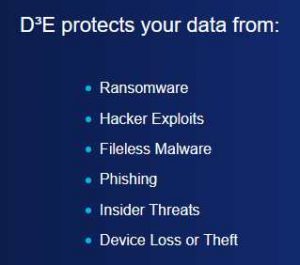
Company’s Data Defense combines D³E software with the firm’s Secure SSDs, and takes a different approach to protect vs. data theft and ransomware than previous cybersecurity technology. D³E for Windows is the first and only data defense software to rely on file-level Zero-Trust access controls to protect sensitive files vs. any threat. It relies on multi-factor authentication and encryption to secure sensitive files anywhere they are shared or stored, even after a security breach. D³E can be used as a standalone software solution or in tandem with the company’s Secure SSDs.
The firm‘s self-defending internal and external Secure SSDs are the second half of the company’s Data Defense solution. Secure SSDs are a storage devices to place cybersecurity protections as close to the data as possible – inside the firmware of the device itself. This patented approach defeats data theft by keeping sensitive data inaccessible and hidden below the OS layer and defends vs. ransomware with ML algorithms built into the storage that detect and repel unauthorized attempts to encrypt data. The Secure SSDs feature ‘safe rooms’ that protect data at all times with zero trust multi-factor authentication and hardware based encryption, even after the user logs in. They remain invisible to an attacker when not in use and disappear from the OS layer when a threat is detected. When paired or used individually, D³E software and Secure SSDs provide a layer of protection that is virtually impossible to bypass.
Correcting 30-year-old problem
The company‘s multi-patented, multi-layered technology corrects what the cybersecurity industry has failed to do for 3 decades: protect sensitive data from any threat vector during a time when cybercrime is spiraling out of control. A Cybersecurity Ventures study predicts that cybercrime could have a multi-trillion-dollar impact on the world economy by 2025.
“With the world becoming ever more interconnected, the frequency and severity of large-scale data breaches have increased exponentially,” said Tanner Johnson, principal analyst, data security, IoT cybersecurity, Omdia, industry research firm. “Cyber-criminals regularly seek to exploit any discovered vulnerability that grants access to steal, destroy, or ransom data. As a result, embedded security solutions like those from Cigent help form the most comprehensive line of data-security defense. By operating as close to the data as possible, Cigent’s offerings work in tandem to provide a defense-in-depth approach that incorporates AI and ML to detect and respond to data theft or ransomware attempts.“
From classified to commercial use
A unique fusion of data recovery, cyberthreat, and storage experts architected Cigent Data Defense to protect sensitive data inside select US government agencies. The company‘s founders handled sensitive work on behalf of US government agencies on advanced data destruction and recovery projects. They retrieved data from severely damaged and encrypted media critical to assisting national security and highly publicized law enforcement actions. In the wake of the Edward Snowden insider theft of classified information, which easily bypassed software-only security layers, the US government-funded Cigent team explored the concept of self-defending storage to combat data theft from any vector. The multi-year R&D effort resulted in storage devices with active and embedded ML-based ransomware detection and advanced proprietary firmware-based cybersecurity protections. This approach to security proved effective and the firm received additional backing from public and private sources to broadly patent its technology and develop commercially available products in the interest of national security. The result is the company’s Data Defense family of products introduced.
“With the rise of ransomware and data theft the ability to enforce data security further down the technology stack is an increasing necessity. Cigent’s unique ability to enforce controls within the storage device provides a level of data security that is not possible with solutions deployed as software at the OS layer, ensuring sensitive data remains protected from loss to physical or digital theft and destruction,” said Bentz Tozer, senior member, technical staff, In-Q-Tel.
Additional Cigent Data Defense capabilities:
-
D³E software:
-
-
Works with industry multi-factor authentication solutions including Windows Hello Fingerprint, Facial Recognition, Custom PIN, Authenticator apps, or Cisco’s Duo Security
-
Defends vs. data theft and ransomware, even when and if the system is compromised
-
Single cloud-based management console provides easy to use, flexible, centralized deployment, configuration, and response management
-
-
-
Self-Defending secure SSDs:
-
-
Configurable secure drives keep data inaccessible and hidden at all times from the Windows File System until accessed by the user with a step-up authentication
-
Firmware based Keep Alive sensor locks Secure Drives and D³E protected files if D³E software is disabled or bypassed
-
Dedicated security processor utilizes ML to detect and neutralize ransomware attacks
-
Dual mode allows for private/secure and non-private storage partitions independent and invisible to one another and adversaries
-
Firmware based ‘Secure Access Logs’ detect unauthorized attempts to access sensitive files
-
-
Availability:
-
The K2 Secure SSD and Dynamic Data Defense Engine (D³E) software are available through the firm and several of channel partners.
-
The Denali Secure SSD will be available in Summer 2021.








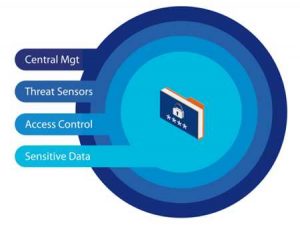
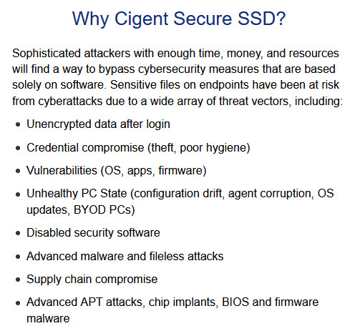
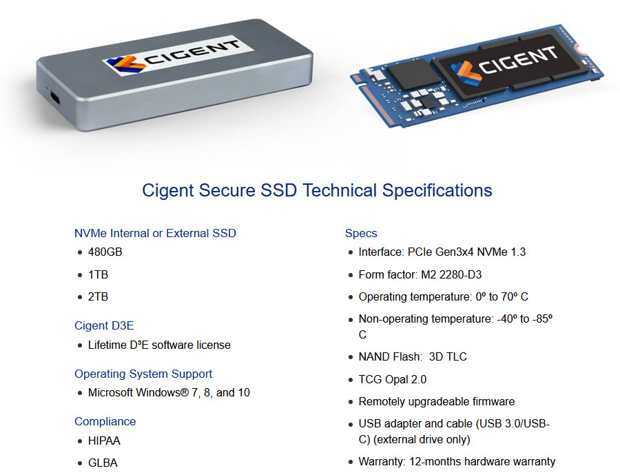
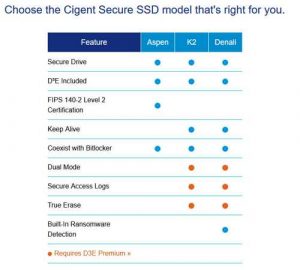





 Subscribe to our free daily newsletter
Subscribe to our free daily newsletter

